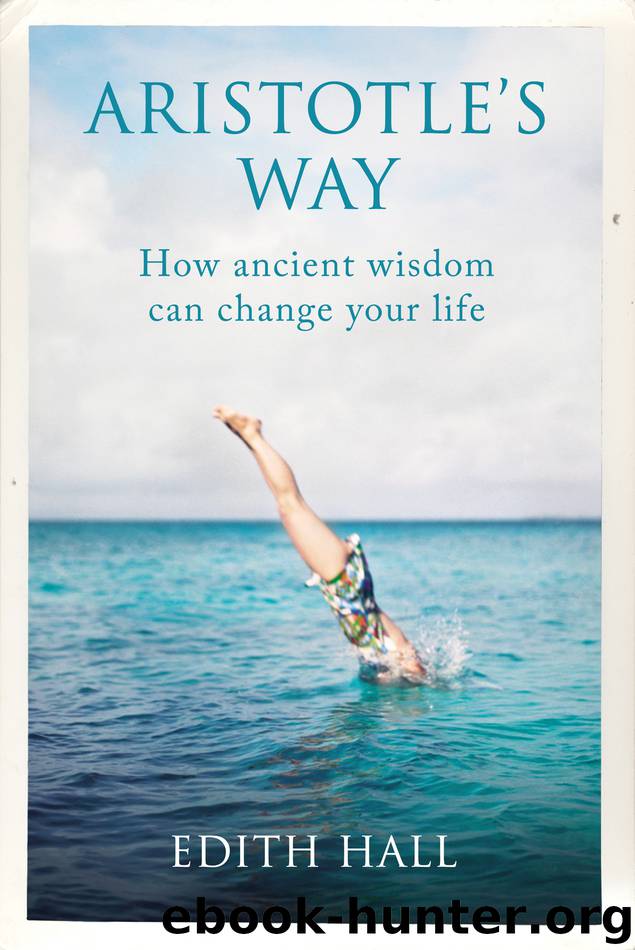Aristotle's Way by Edith Hall

Author:Edith Hall
Language: eng
Format: epub
Publisher: Random House
Chapter 7
Love
HAPPINESS HAS ALWAYS depended on personal relationships. Love may not be the only thing that makes the human ‘world go round’, but it is certainly one of the most important. Whom to love, and how to love them, are decisions with which we are all faced at some point in our lives. Although we have few options until adulthood about the members of our immediate family, even schoolchildren make choices about which of their peers to befriend in the classroom or playground. Close friends become enormously important in the early teens, as we learn about forming intimate bonds outside the home. Then comes the excitement of discovering sexuality and romance and the first ‘love’ relationships as designated by the English phrase ‘to be in love with’ someone.
But forging loving relationships is only one part of the story; knowing when to end a close friendship, or at least demote it from intimate to merely sociable, concerns everyone sooner or later. Few of us reach middle age without falling out with someone we love, even a parent, child or sibling. Lifelong friends can suddenly prove disloyal or exploitative. A large proportion of marriages and cohabiting arrangements end in divorce or the equivalent. So how are we to maximise our chances of finding happiness through our close relationships with others?
Although Aristotle recognises the power of sex, his long and detailed discussion of love (philia) and relationships feels so surprisingly modern because he does not treat sexual relationships as inherently exceptional or qualitatively different from other love bonds. Relationships involving sex are just one subset of the category of philoi, a term often far too weakly translated as ‘friends’. The same basic principles apply to both sexual (i.e. marriage or similar arrangements) and nonsexual friendships. All relationships with people we love require effort, but the rewards are inestimable.
Aristotle regarded love as essential to human life. Many of us fantasise about affection of all kinds happening mystically and spontaneously, but Aristotle knew that it is a matter of hard work. He begins his account of human society with the primary and, he says, ‘most natural’ partnership – the marital unit. This is an extremely intense form of friendship. It exists between you and the individual person you marry or choose to live with permanently. He envisages a heterosexual husband and wife, brought together for mutual support, with complementary spheres of competence. They also need one another if the human race is to reproduce itself, and ‘neither the female can effect this without the male, nor the male without the female; this is why the union of the sexes has of necessity arisen’. He nowhere discusses same-sex unions, although he certainly never condemns them, either. He does endorse the speech made by Aristophanes in Plato’s Symposium, where humans are divided into three kinds of erotically fused couples: woman/man, woman/woman, and man/man. Aristotle’s point is not that any of them is intrinsically wrong, but that excessive amorous love of any kind outside the household can be socially destabilising.
Download
This site does not store any files on its server. We only index and link to content provided by other sites. Please contact the content providers to delete copyright contents if any and email us, we'll remove relevant links or contents immediately.
| Anthropology | Archaeology |
| Philosophy | Politics & Government |
| Social Sciences | Sociology |
| Women's Studies |
The remains of the day by Kazuo Ishiguro(9000)
Tools of Titans by Timothy Ferriss(8396)
Giovanni's Room by James Baldwin(7346)
The Black Swan by Nassim Nicholas Taleb(7129)
Inner Engineering: A Yogi's Guide to Joy by Sadhguru(6796)
The Way of Zen by Alan W. Watts(6614)
The Power of Now: A Guide to Spiritual Enlightenment by Eckhart Tolle(5783)
Asking the Right Questions: A Guide to Critical Thinking by M. Neil Browne & Stuart M. Keeley(5775)
The Six Wives Of Henry VIII (WOMEN IN HISTORY) by Fraser Antonia(5515)
Astrophysics for People in a Hurry by Neil DeGrasse Tyson(5190)
Housekeeping by Marilynne Robinson(4449)
12 Rules for Life by Jordan B. Peterson(4305)
Ikigai by Héctor García & Francesc Miralles(4275)
Double Down (Diary of a Wimpy Kid Book 11) by Jeff Kinney(4272)
The Ethical Slut by Janet W. Hardy(4253)
Skin in the Game by Nassim Nicholas Taleb(4250)
The Art of Happiness by The Dalai Lama(4130)
Skin in the Game: Hidden Asymmetries in Daily Life by Nassim Nicholas Taleb(4007)
Walking by Henry David Thoreau(3962)
